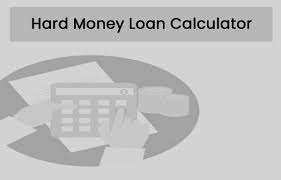In the dynamic realm of real estate investing, seizing opportunities quickly is often the key to success. Hard money loans have emerged as a valuable resource for investors looking to fund their projects promptly. To navigate this financial landscape effectively, having a Hard Money Loan Calculator at your disposal is essential. In this comprehensive guide, we’ll delve into the world of hard money loans, understand how these calculators work, and explore the benefits of using them for your real estate investments.
Hard Money Loan Calculator
Understanding Hard Money Loan
Before we dive into the realm of hard money loan calculator, let’s grasp the fundamentals of hard money loans themselves.
What Are Hard Money Loans?
Hard money loans, sometimes referred to as private money loans, are a unique form of financing primarily used in real estate investing. Unlike traditional mortgages, hard money loans are typically provided by private investors or lending companies rather than banks or credit unions. These loans are known for their speed and flexibility, making them ideal for investors who need quick access to capital for time-sensitive projects.
Key Features of Hard Money Loan:
Speed: Hard money loans are known for their rapid approval and funding processes, often taking a matter of days rather than weeks or months.
Asset-Based: These loans are asset-based, meaning they are secured by the value of the real estate property being purchased.
Short Terms: Hard money loans usually have short terms, typically ranging from six months to a few years.
Higher Interest Rates: Due to the convenience and speed they offer, hard money loans tend to have higher interest rates compared to traditional mortgages.
Flexible Terms: Lenders may be more flexible when it comes to credit scores and financial histories, focusing more on the property’s value and potential.
Common Uses of Hard Money Loans:
Fix and Flip Projects: Real estate investors often use hard money loans to acquire properties, renovate them, and sell them for a profit.
Bridge Loans: Investors may use hard money loans to cover the gap between the purchase of a new property and the sale of an existing one.
Property Rehabilitation: When a property requires significant repairs or renovations, a hard money loan can provide the necessary funds.
The Role of Hard Money Loan Calculator
Now that we have a solid understanding of hard money loans, let’s explore how hard money loan calculators come into play and why they are indispensable for real estate investors.
What Is a Hard Money Loan Calculator?
A hard money loan calculator is a specialized financial tool designed to assist real estate investors in assessing the financial aspects of their investment projects. These calculators are tailored to the unique features of hard money loans and can provide investors with valuable insights into their potential deals.
Key Functions of Hard Money Loan Calculator:
Loan Estimations: By inputting essential details such as the loan amount, interest rate, loan term, and potential property value, investors can quickly obtain accurate estimations of their loan costs.
Project Analysis: Hard money loan calculators can help investors analyze the financial viability of their real estate projects. They can assess whether the potential returns outweigh the costs associated with the loan.
Budget Planning: Investors can use these calculators to plan their budgets effectively. They can determine how much they need to borrow, what their monthly payments will be, and whether the project aligns with their financial goals.
Interest Rate Comparison: Hard money loan calculators allow investors to compare different loan offers. By inputting various interest rates, they can see how each rate affects the overall cost of borrowing.
Amortization Schedules: Many hard money loan calculators provide detailed amortization schedules. These schedules outline how each payment is allocated between the principal amount borrowed and the interest, giving investors a clear picture of the loan’s progression.
Pros of Using Hard Money Loan Calculator
Precise Financial Planning: Hard money loan calculator provide precise estimates, helping investors plan their projects down to the last detail.
Time Savings: These calculators offer rapid calculations, allowing investors to evaluate multiple scenarios quickly.
Informed Decision-Making: With accurate financial data at their fingertips, investors can make informed decisions about their investment opportunities.
Improved Negotiation: Armed with loan estimations, investors can negotiate better terms with lenders, potentially saving money on interest.
Cons of Using Hard Money Loan Calculator
Initial Learning Curve: Some investors may find it challenging to navigate these calculators initially, but the learning curve is generally not steep.
Potential for Oversimplification: While hard money loan calculators are valuable tools, they may oversimplify certain aspects of real estate investing. Investors should use them in conjunction with a broader understanding of the market.

Hard Money Calculator FAQ
How does a hard money loan work?
A hard money loan is a type of short-term, asset-based financing primarily used in real estate. It works by borrowing funds from a private investor or a hard money lender. Unlike traditional loans, hard money loans are typically based on the value of a property rather than the borrower’s creditworthiness. Borrowers often use hard money loans for real estate investments, fix-and-flip projects, or when they need quick access to funds. The loan is secured by the property itself, and the borrower is expected to repay the loan, along with interest, in a relatively short period, usually 6 to 12 months.
How is hard money interest calculated?
Hard money interest is calculated as a percentage of the loan amount, often referred to as the “interest rate” or “points.” Points are a one-time fee charged by the lender, typically ranging from 2% to 5% of the loan amount. Additionally, hard money lenders charge an annual interest rate, commonly between 8% and 15%, which is calculated on the outstanding balance of the loan. Interest is typically paid monthly, and the borrower’s monthly payments include both principal and interest.
How Do Hard Money Loan Monthly Payments Work?
Hard money loan monthly payments consist of two components: principal and interest. Borrowers make regular monthly payments to the lender, which includes repayment of a portion of the loan principal and the interest accrued. These payments continue until the loan is fully paid off, typically within a short loan term. The exact breakdown of principal and interest in each payment depends on the loan terms specified in the agreement.
How Much Are Hard Money Loan Rates?
Hard money loan rates vary depending on factors such as the lender’s policies, the borrower’s creditworthiness, the loan-to-value ratio, and the type of property. Generally, hard money loan rates range from 8% to 15% annually. However, these rates can be higher or lower, depending on the specific circumstances of the loan.
How much do you have to put down on a hard money loan?
The down payment required for a hard money loan can vary widely depending on the lender and the type of property. It typically ranges from 20% to 40% of the property’s purchase price or appraised value. In some cases, lenders may require a lower down payment, but a larger down payment can improve the borrower’s chances of approval and result in more favorable loan terms.
What are the credit score requirements for a hard money loan?
Unlike traditional loans, hard money loans are primarily based on the value of the property and the borrower’s equity, not their credit score. Consequently, hard money lenders are often more concerned with the property’s potential value and the borrower’s experience in real estate investment than their credit score. While a good credit score can be beneficial, it is not a strict requirement for obtaining a hard money loan.
What’s the difference between a hard money loan and a bridge loan?
Hard money loans and bridge loans are both short-term financing options, but they differ in their sources and purposes. Hard money loans typically come from private investors or specialized hard money lenders and are often used for real estate investment or property acquisition. Bridge loans, on the other hand, are usually offered by banks or traditional lenders and are used to “bridge” the gap between buying a new property and selling an existing one. Bridge loans are often more difficult to qualify for and may have stricter credit requirements compared to hard money loans.
Why do people use hard money loans rather than traditional loans?
People use hard money loans for several reasons:
- Speed: Hard money loans can be funded quickly, making them ideal for time-sensitive real estate transactions.
- Flexibility: Hard money lenders are often more willing to work with borrowers who have unique financial situations or less-than-perfect credit.
- Real Estate Investment: Hard money loans are commonly used by real estate investors for property acquisition, renovation, and flipping.
- Short-Term Needs: Borrowers who require short-term financing for real estate projects find hard money loans more suitable than traditional long-term mortgages.
What is the origination fee (hard money loan points)?
The origination fee in a hard money loan is often referred to as “points.” One point equals 1% of the loan amount. Lenders charge points as an upfront fee for processing and funding the loan. Typically, hard money lenders charge between two and five points, depending on various factors. Borrowers can choose to pay points upfront or roll them into the loan amount. Paying more points upfront can result in a lower interest rate over the life of the loan, while fewer points may result in a higher interest rate.
Conclusion: Empowering Your Real Estate Investments
In the competitive and fast-paced world of real estate investing, access to accurate financial tools is paramount. Hard money loan calculator serve as indispensable resources for investors looking to make informed decisions, streamline their financial planning, and seize opportunities with confidence. As you embark on your real estate investment journey, consider incorporating a hard money loan calculator into your toolkit, and watch how it empowers you to achieve your investment goals with precision and clarity.





